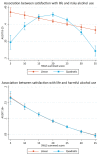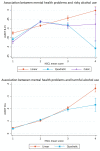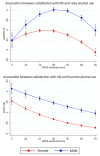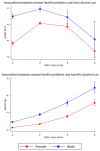Satisfaction With Life, Mental Health Problems and Potential Alcohol-Related Problems Among Norwegian University Students
- PMID: 33633602
- PMCID: PMC7900511
- DOI: 10.3389/fpsyt.2021.578180
Satisfaction With Life, Mental Health Problems and Potential Alcohol-Related Problems Among Norwegian University Students
Abstract
Objective: Recent studies have shown that today's college students more than ever are struggling with mental health and alcohol problems. While poor satisfaction with life and mental health problems have been linked to higher alcohol consumption, there is still a lack of studies examining in detail the shape and nature of the relationship between mental health and alcohol consumption. Aim: To investigate the associations between satisfaction with life, mental health problems and potential alcohol-related problems among Norwegian university students. The shape of the associations was also examined. Methods: Data were drawn from a 2018 national survey of students in higher education in Norway (the SHoT-study). Associations between satisfaction with life, mental health problems and potential alcohol-related problems (AUDIT; risky and harmful alcohol use) were investigated using logistic regression. Both crude models and models adjusted for age, gender and marital status were conducted. To investigate the shape of the associations, logistic regression with quadric and cubic terms was tested. Results: Decreased satisfaction with life and increased mental health problems were associated with potential alcohol-related problems. For satisfaction with life, a curvilinear association with risky alcohol use and a linear association with harmful alcohol use was identified. For mental health problems, curvilinear associations were found for both risky and harmful alcohol use. Conclusion: Many students report potential alcohol-related problems. Students with harmful alcohol use seem to be more at risk of reduced satisfaction with life and increased mental health problems than students with risky alcohol use. Educational institutions may be an ideal setting for raising awareness of mental health issues and responsible alcohol consumption among students. The present study contributes with important information about the shape of the associations between satisfaction with life, mental health problems and potential alcohol-related problems in the student population.
Keywords: college students; mental health problems; population-based study; potential alcohol-related problems; satisfaction with life; university students.
Copyright © 2021 Jensen, Haug, Sivertsen and Skogen.
Conflict of interest statement
The authors declare that the research was conducted in the absence of any commercial or financial relationships that could be construed as a potential conflict of interest.
Figures





Similar articles
-
Alcohol consumption, life satisfaction and mental health among Norwegian college and university students.Addict Behav Rep. 2019 Aug 22;10:100216. doi: 10.1016/j.abrep.2019.100216. eCollection 2019 Dec. Addict Behav Rep. 2019. PMID: 31692685 Free PMC article.
-
Alcohol-related problems among college and university students in Norway: extent of the problem.Scand J Public Health. 2021 Jun;49(4):402-410. doi: 10.1177/1403494819863515. Epub 2019 Jul 18. Scand J Public Health. 2021. PMID: 31319770
-
Is the Association Between Alcohol Consumption and Mental Well-Being in University Students Linear, Curvilinear or Absent?Subst Use Misuse. 2024;59(7):1083-1094. doi: 10.1080/10826084.2024.2320382. Epub 2024 Feb 29. Subst Use Misuse. 2024. PMID: 38424738
-
The association between levels of alcohol consumption and mental health problems and academic performance among young university students.PLoS One. 2017 Jun 28;12(6):e0178142. doi: 10.1371/journal.pone.0178142. eCollection 2017. PLoS One. 2017. PMID: 28658300 Free PMC article.
-
The Extent of Alcohol-Related Problems Among College and University Students in Norway Prior to and During the COVID-19 Pandemic.Front Public Health. 2022 May 26;10:876841. doi: 10.3389/fpubh.2022.876841. eCollection 2022. Front Public Health. 2022. PMID: 35719681 Free PMC article.
Cited by
-
Alcohol Use Disorders among Slovak and Czech University Students: A Closer Look at Tobacco Use, Cannabis Use and Socio-Demographic Characteristics.Int J Environ Res Public Health. 2021 Nov 3;18(21):11565. doi: 10.3390/ijerph182111565. Int J Environ Res Public Health. 2021. PMID: 34770080 Free PMC article.
-
The gendered relationship between illicit substance use and self-harm in university students.Soc Psychiatry Psychiatr Epidemiol. 2022 Apr;57(4):709-720. doi: 10.1007/s00127-021-02209-3. Epub 2022 Jan 16. Soc Psychiatry Psychiatr Epidemiol. 2022. PMID: 35034147 Free PMC article.
-
Adherence to Mediterranean Diet, Alcohol Consumption and Emotional Eating in Spanish University Students.Nutrients. 2021 Sep 11;13(9):3174. doi: 10.3390/nu13093174. Nutrients. 2021. PMID: 34579051 Free PMC article.
-
Family functioning and life satisfaction among female university students during COVID-19 outbreak: the mediating role of hope and resilience.BMC Womens Health. 2022 Dec 5;22(1):493. doi: 10.1186/s12905-022-02103-3. BMC Womens Health. 2022. PMID: 36471359 Free PMC article.
-
Swedish exchange students' alcohol use, drug use, risky sexual behaviour, mental health, and self-rated health: A follow-up study.Nordisk Alkohol Nark. 2023 Jun;40(3):287-300. doi: 10.1177/14550725231160331. Epub 2023 Mar 15. Nordisk Alkohol Nark. 2023. PMID: 37255608 Free PMC article.
References
-
- Walters KS, Bulmer SM, Troiano PF, Obiaka U, Bonhomme R. Substance use, anxiety, and depressive symptoms among college students. J Child Adolesc Subst Abus. (2018) 27:103–11. 10.1080/1067828X.2017.1420507 - DOI
LinkOut - more resources
Full Text Sources
Other Literature Sources

